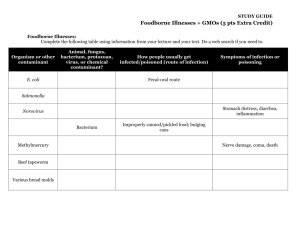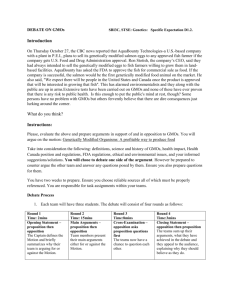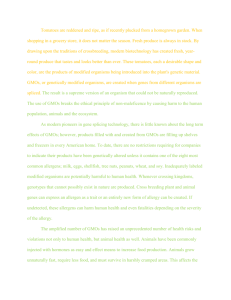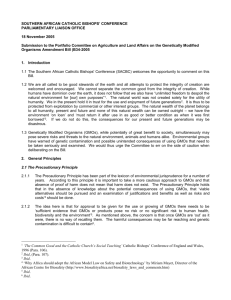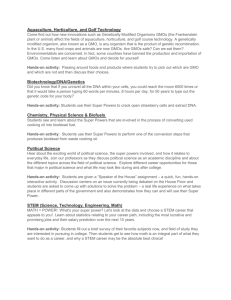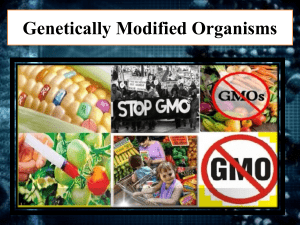FAIR CT98-3844 (DG12 - SSMI) - Centre for the Study of
advertisement
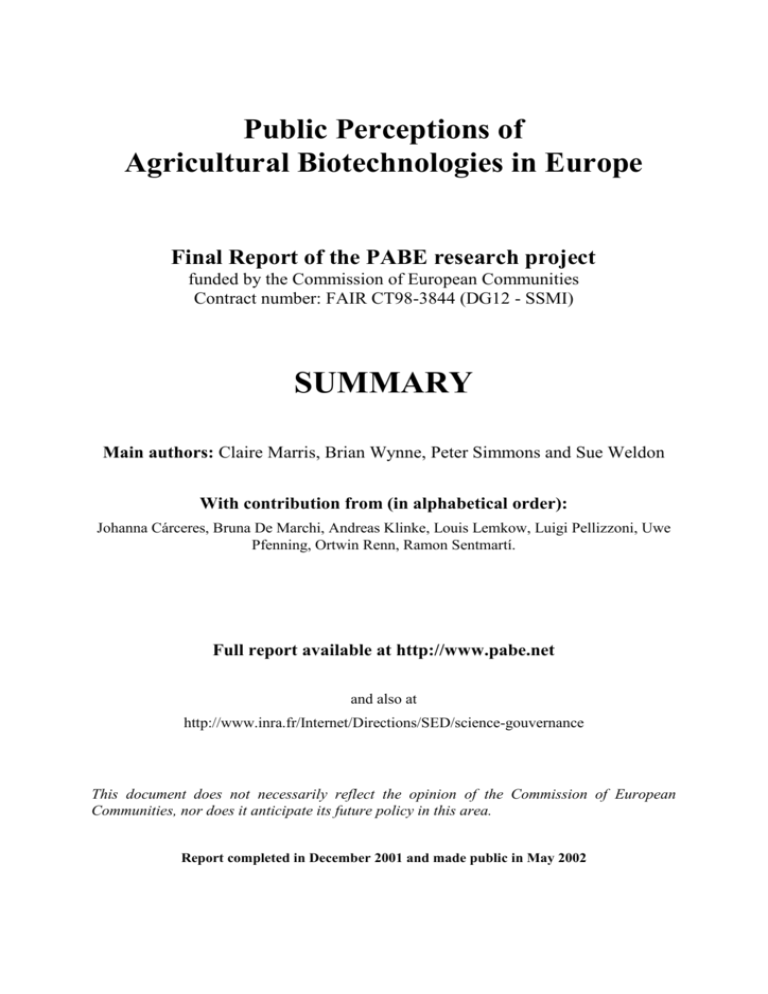
Public Perceptions of Agricultural Biotechnologies in Europe Final Report of the PABE research project funded by the Commission of European Communities Contract number: FAIR CT98-3844 (DG12 - SSMI) SUMMARY Main authors: Claire Marris, Brian Wynne, Peter Simmons and Sue Weldon With contribution from (in alphabetical order): Johanna Cárceres, Bruna De Marchi, Andreas Klinke, Louis Lemkow, Luigi Pellizzoni, Uwe Pfenning, Ortwin Renn, Ramon Sentmartí. Full report available at http://www.pabe.net and also at http://www.inra.fr/Internet/Directions/SED/science-gouvernance This document does not necessarily reflect the opinion of the Commission of European Communities, nor does it anticipate its future policy in this area. Report completed in December 2001 and made public in May 2002 Page 1 The main conclusion from this study is that most stakeholders in the GM debate misunderstand public responses to GMOs, and that this represents one of the key underlying causes for the current impasse in the GM debate. Almost all popular opinions on the alleged misperceptions about the alleged view of “the man and woman on the street” turned out to be simply myths. The use of GMOs in agriculture and food has become one of the most controversial topics in contemporary societies, especially in Europe. Promoters of agricultural biotechnologies are concerned that the current public controversy on GMOs in Europe is impeding the development and commercialisation of a new technological field considered to be of strategic economic importance for Europe. At the same time, critics who believe that GMOs involve unacceptable impacts on the environment, health and society, continue to feel that their concerns have not been addressed. The public is somehow caught in the middle. What do people in Europe think about the use of genetically modified organisms in agriculture and food? What expectations and concerns do they have? How do they shape their views when faced with a new issue such as this? How do they perceive this issue within the whole context of modernisation and lifestyle changes? During the last few years agricultural biotechnologies have been the subject of numerous inquiries, consultation exercises and public debates - and the number continues to grow - yet most protagonists, on both sides, remain dissatisfied. The need to understand public responses to biotechnology has never been more pressing. But understanding the response of policy makers to perceived public concerns is also essential. A research team from five European countries directed by Prof. Brian Wynne from Lancaster University (UK) was asked by the European Commission to conduct an in-depth study on public attitudes, perceptions and evaluations of biotechnology in agriculture and food. In order to get an accurate and comprehensive impression of public understanding of GMOs, the team selected the method of focus groups interviews, an empirical research methods that is particularly adapted to revealing the underlying factors that shape public attitudes. A total of 55 focus groups were organised, between 1998 and 2000, in the five participating countries: United Kingdom, Spain, Italy, France and Germany. In addition to the focus groups, the researchers conducted interviews with the key actors and organised several workshops with stakeholders in the debate. Characterisations of public responses to GMOs in decision-making circles are typically framed either in terms of a lack of knowledge - prompting moves to educate the public - or of 'non-scientific' 'ethical' concerns - resulting in the appointment of expert ethical advisers or public consultations about the social acceptability of GMOs. This study shows that these dominant characterisations of the public, and the policies which derive from them, do not capture the full nature of public concerns, nor do they recognise the social, cultural and institutional factors shaping those concerns. The research reported here reveals a more complex picture, in which the distinctions often made between 'real risk' and 'perceived risk', between 'risk' and 'ethical' concerns, or between 'scientific' and 'non-scientific' concerns, are blurred. The PABE study not only highlights the dynamics of societal concerns but also traces them back to the problems inherent in official views of the public and its perceptions of technological risk. Page 2 Two types of results about public perceptions of GMOs are presented in the report: - Perceptions of GMOs among ordinary citizens were studied using focus groups held in five EU Member States: France, Germany, Italy, Spain and the United Kingdom (a total of 55 sessions). - Perceptions of public responses to GMOs among stakeholders (actors engaged in the GMO controversy) were studied using interviews, participant observation and document analysis. The comparison of these two types of results sheds new light on the subject of public perceptions of GMOs. It reveals the persistence of a number of entrenched views about the public shared by numerous policy actors which are not supported by our analysis of the views of ordinary citizens as expressed in the focus groups. This has important policy implications, because these mistaken interpretations of public perceptions play an influential role in shaping the communication strategies and policies of decision-makers in government and business, as well as in consumer and environmental NGOs. Thus, policies continue to fail to respond adequately to public demands, and therefore fail to resolve or advance the debate. New policies and strategies - even if they are innovative and sincerely seek to integrate public views - are likely to fail if they continue to be based on these entrenched misrepresentations of the public. In these circumstances, it seems to us that the most positive contribution from this research on public perceptions of GMOs is to reveal and analyse the gulf found between stakeholder views of the public, and public views as expressed in our focus groups. The study concludes by identifying as a priority the need for a broad based cultural change in policy thinking about public perceptions of science, technology, and risks. Policy makers should be prepared to consider that the source of the problem is not only to be found in the behaviour of the public but also in the behaviour of institutions responsible for creating and managing innovations and risk. This seems to us the most urgent imperative for the development of a more constructive and satisfactory debate on agricultural biotechnologies in Europe. Page 3 Key Findings 1. Overwhelming similarity of focus group findings across countries, groups, and time Similarity of focus group results between countries Contrary to our expectations, there was an overwhelming similarity in the focus group results from the five countries studied, despite national differences in the amount of media coverage and the intensity of the public debate. There were some national differences in the emphasis placed on particular views, and in the examples used to support those views, but underlying those differences, we found a broad similarity in the repertoire of arguments mobilised by focus group participants in all five countries. Similarity of focus group results within countries Contrary to our expectations, few significant differences were observed between the 11 focus groups conducted in each country, despite the fact that recruitment was deliberately designed to produce groups thought likely to have very different views on this subject. There were differences in the style of language used, and in lifestyle choices made by participants, but underlying those differences, we found a broad similarity in the repertoire of arguments mobilised by all the focus group participants. Similarity of focus group results over time No fundamental evolution in the repertoire of arguments used by focus group participants was identified over time (from September 1998 to October 1999) despite the fact that, in some countries (especially the UK and France), the intensity of the public debate sharply increased during this period. No direct relationship between public perceptions and public controversy The similarity of focus group results across countries, between groups and over time, challenges the often heard hypothesis of a direct relationship between public perceptions and the intensity of public controversy on the subject. 2. Identification of underlying factors that shape public responses to GMOs The similarity of focus group results obtained within and between the five countries suggests that the underlying socio-cultural factors identified through this research reflect commonly shared salient dimensions of the experience of ordinary people which are important in shaping their responses to agricultural biotechnologies. Indeed the results from this study give important clues as to what are these salient dimensions of public experience. Moreover, the salient factors of public responses identified from our analysis of focus group discussions with ordinary citizens are not the factors usually thought to be determinant by many stakeholders. We identify and describe 10 "myths" about public responses to GMOs which are widely held by stakeholders, and demonstrate how the focus group results contradict or qualify these widely held views. Page 4 3. Dominant stakeholder views about public responses to GMOs: Myth 1: The primordial cause of the problem is that lay people are ignorant about scientific facts Myth 2: People are either 'for' or 'against' GMOs Myth 3: Consumers accept medical GMOs but refuse GMOs used in food and agriculture Myth 4: European consumers are behaving selfishly towards the poor in the Third World Myth 5: Consumers want labelling in order to exercise their freedom of choice Myth 6: The public thinks - wrongly - that GMOs are unnatural Myth 7: It's the fault of the BSE crisis: since then, citizens no longer trust regulatory institutions Myth 8: The public demands 'zero risk' - and this is not reasonable Myth 9: Public opposition to GMOs is due to "other - ethical or political - factors" Myth 10: The public is a malleable victim of distorting sensationalist media 4. The focus group results challenged these 10 myths in the following ways: Although ordinary citizens are largely ignorant of the scientific technicalities of genetic manipulation, and of developments in research, regulation and commercialisation related to GMOs, this lack of knowledge does not explain their response to agricultural biotechnologies. The concerns expressed by the focus group participants were not, in the main, based on erroneous beliefs about GMOs. Key questions raised in the group discussions were: - Why do we need GMOs? What are the benefits? Who will benefit from their use? Who decided that they should be developed and how? Why were we not better informed about their use in our food, before their arrival on the market? Why are we not given an effective choice about whether or not to buy and consume these products? Do regulatory authorities have sufficient powers and resources to effectively counterbalance large companies who wish to develop these products? Can controls imposed by regulatory authorities be applied effectively? Have the risks been seriously assessed? By whom? How? Have potential long-term consequences been assessed? How? How have irreducible uncertainties and unavoidable domains of ignorance been taken into account in decision-making? What plans exist for remedial action if and when unforeseen harmful impacts occur? Who will be responsible in case of unforeseen harm? How will they be held to account? Page 5 Participants' perceptions of GMOs were based on empirical knowledge, not on subjective or emotional responses; but the kind of knowledge mobilised by the lay public to evaluate GMOs is very different to the kind of knowledge assumed to be relevant by scientists and promoters of GMOs. Scientists and policy makers tend to assume that ordinary citizens need to have specialised knowledge about gene modification techniques in order to form a rational opinion about GMOs. However, when supporting their arguments about GMOs, the focus group participants used three different types of lay knowledge: - Non-specialist knowledge about the behaviour of insects, plants and animals (e.g. "bees fly from field to field"), which it seemed to them was often ignored or obscured in specialised scientific discussions. - Knowledge about human fallibility, derived from their daily experience, which had taught them that formal rules and regulations, though well intended, would not, in the real world, be fully applied. - Knowledge about the past behaviour of institutions responsible for the development and regulation of technological innovations and risks. This third type of knowledge was the most predominant. Thus, the concerns expressed in the focus groups were mostly based on empirical lay knowledge about the past behaviour of institutions responsible for the development and regulation of technological innovations and risks, supported by numerous commonly shared experiences, which were considered to be unsatisfactory in many ways. In this context, BSE was not regarded as an exception. Rather, focus group participants portrayed BSE as an exemplary case demonstrating the normal behaviour of such institutions. Many other examples of past mismanagement were also brought up, which, in the eyes of the participants, shared very similar characteristics and demonstrated the lack of trustworthiness of these institutions. Moreover the participants felt that policy makers had not learnt from these experiences, in that they had not addressed any of the problems that they felt had been demonstrated by the BSE affair. They therefore expected these institutions to continue to behave in the same way with respect to GMOs, and other issues. Participants did not, overall, express entrenched opinions 'for' or 'against' GMOs. Their responses were more nuanced and sophisticated. Ambivalence was the overwhelming feeling expressed, since participants recognised both positive and negative dimensions of developments in agricultural biotechnology. Participants were also ambivalent about 'progress' in agriculture and food more generally. Most focus groups raised concerns about the current trajectory of developments in food production, manufacturing and distribution. These were associated with the loss of particular lifestyles and culinary skills: "we don't have or take the time to cook for each other anymore". There was a deep felt concern that "we do not know what we eat", and that it was increasingly difficult for individuals to judge the “good or bad” of different food items. At the same time, however, the same participants expressed satisfaction with the modern standards of hygiene, noting that food had never been safer and that spending less time shopping and cooking was convenient and provided more time for other occupations. But when expressing satisfaction with current practice, the participants had doubts about the benefits of further industrialisation of food production. In this context, GMOs were perceived as possibly representing "a step too far" in an ongoing trajectory. "There is no need to accelerate the process of industrialisation within our countries, where food is abundant and food choices are already overwhelming” was a view echoed in many focus groups. Page 6 Participants discriminated between different types of GMOs, but this could not be reduced to a simple distinction between applications in agriculture and food, and applications in the medical field. Medical applications were more favourably perceived, but this was not solely, or predominantly, based on an appreciation of personal benefits. Many other factors relating to access to information, risk assessment procedures and regulation were felt to be, overall, more satisfactory in the medical field. Participants found some of the benefits claimed for GMOs (improving health, reducing the use of pesticides, improving the efficiency of agriculture in developing countries) laudable, but were sceptical about whether they will be realised. Moreover, communication strategies by biotechnology firms which emphasise that GMOs could 'feed the world' were perceived very negatively, as a manipulative marketing ploy, especially since they could not see any real evidence that this promise was being seriously addressed and fulfilled. Participants wanted labelling of GM food products, but this was not simply in order to be able to protect themselves against putative health risks. Labelling was regarded as a minimum requirement to enable consumers to know and choose what they were eating. Some participants also regarded labelling as an instrument to allow consumers to boycott the products in order 'send a message' to manufacturers about a whole range of concerns other than health risks associated with GMOs; and to enable post-market monitoring of unintended harmful effects, and removal from the market if such harm was identified. Labelling would also demonstrate that "the [the promoters] have nothing to hide". Participants did tend to describe GMOs as 'unnatural', but this does not mean that they felt that all other agricultural innovations, including 'conventional' breeding were 'natural'. Thus, it is for example mistaken to portray consumers who are concerned about GM food products as necessarily preferring products produced using chemical pesticides. Participants did not ask for 'zero risk' or full certainty with respect to the impacts of GMOs, and were well aware that daily activities of ordinary lives are associated with numerous risks and benefits which have to be balanced against one another. Moreover, they took for granted that science could never accurately predict all future impacts of a new technology. Rather, they felt strongly that inherent and unavoidable uncertainties should be acknowledged by expert institutions, and be taken into account in decision making. It was the denial of uncertainty by the institutions responsible which they found disconcerting and untrustworthy. Participants, when discussing GMOs, raised many concerns raised which did not relate directly to risk as defined by scientific experts or regulations. But the wider ethical and sociopolitical considerations raised could not be simplistically distinguished from 'scientific' of 'risk' dimensions. The focus group results demonstrated how public responses to GMOs were shaped by underlying factors which blurred the boundaries between 'science' and 'politics', and also between 'risk' and 'ethics'. The focus groups were not designed to explore the reception of media messages by lay people, but our results confirm previous research in this field which demonstrates that the public is actively engaged in the interpretation and judgement of multiple forms of mediation and information, some of it involving the mass media, some not. Thus members of the public cannot be characterised as victims who simply absorb what is drummed into them by the media. Yet the fixation, by many stakeholders, on the role of the mass media as the key determinant of public views implies a passive and intellectually vacuous public; a public that is simply the tabula rasa upon which media discourses are inscribed. Page 7 5. Misconceptions about Trust Trust - or rather lack of trust - has increasingly been identified as a key problem and issue to be addressed by policy makers involved in risk management. The results presented here suggest that trust is indeed an important dimension in public responses to proposed technologies and policies, but that the way in which trust is most often conceptualised in policy circles is misleading and unproductive. Restoring public trust in regulatory institutions tends to be seen as an issue to be resolved by improved communication strategies and is largely treated independently from other policy decisions. But the results presented here demonstrate that the issue of trust cuts across all the other socio-cultural factors identified, and that restoring trust would require not just better public relations strategies, but more profound changes in institutional culture and practice. In order to restore trust, institutions would need to demonstrate their capacity for adequate risk management of risks through consistent behaviour over a long period, and across different fields (not just GMOs), by, for example: - Admitting past errors. - Admitting that they don't always necessarily know best. - Admitting uncertainty, and explaining how this has been taken into account in decisionmaking. - Utilising input from all relevant sources (not just scientific experts). - Being transparent about how decisions are made, including explaining how different interests, risks and benefits have been balanced against one another. - Imposing heavy sanctions in cases where mismanagement or fraud is identified. - Overall, demonstrating that views of the public are understood, valued, respected, and taken into account by decision-makers - even if they cannot all be satisfied. Page 8 Contacts for the research partners UK (Co-ordinator) Brian Wynne, Peter Simmons1 and Sue Weldon Centre for the Study of Environmental Change Lancaster University Lancaster LA1 4YT United Kingdom Tel: +44 1524 592674 Fax: +44 1524 846339 E-mail: B.Wynne@lancaster.ac.uk, P.Simmons@uea.ac.uk, S.Weldon@lancaster.ac.uk France Claire Marris2 and Martin O'Connor Centre d'Economie et d'Ethique pour l'Environnement et le Développement (C3ED) Université de Versailles Saint-Quentin-en-Yvelines 47 Boulevard Vauban 78047 Guyancourt Cedex France Tel: +33 1 39 25 53 75 Fax: +33 1 39 25 53 00 E-mail: marris@ivry.inra.fr Italy Bruna De Marchi and Luigi Pellizzoni Programma Emergenze di Massa (PEM) Istituto di Sociologia Internazionale Gorizia (ISIG) Via Mazzini 13 34170 Gorizia Italy Tel: +39 0481 533 632 Fax: +39 0481 532 094 E-mail: bruna.de-marchi@libero.it Germany Ortwin Renn Akademie für Technikfolgenabschätzung in Baden-Württemberg Industriestr. 5 70565 Stuttgart Germany Tel: +49-711-9063-160 Fax: +49-711-9063-175 E-mail: renn@afta-bw.de Spain Louis Lemkow, Ramon Sentmartí and Johanna Cáceres Sociology Department Universitat Autònoma de Barcelona 08193 Bellaterra Catalonia Spain Tel: +34 93 58 11383 Fax: +34 93 58 12827 E-mail: louis.lemkow@uab.es or sentmarti@agronet.org 1 Peter Simmons is now at the University of East Anglia, School of Environmental Sciences, NR4 7TJ Norwich, United Kingdom. Tel. +44 (0)1603 661054. 2 Claire Marris is now at the Institut National de la Recherche Agronomique, Unité STEPE, 65 Boulevard de Brandebourg, 94205 Ivry-sur-Seine, France. E-mail: marris@ivry.inra.fr. Tel. +33 (0)1 49 59 69 38.
